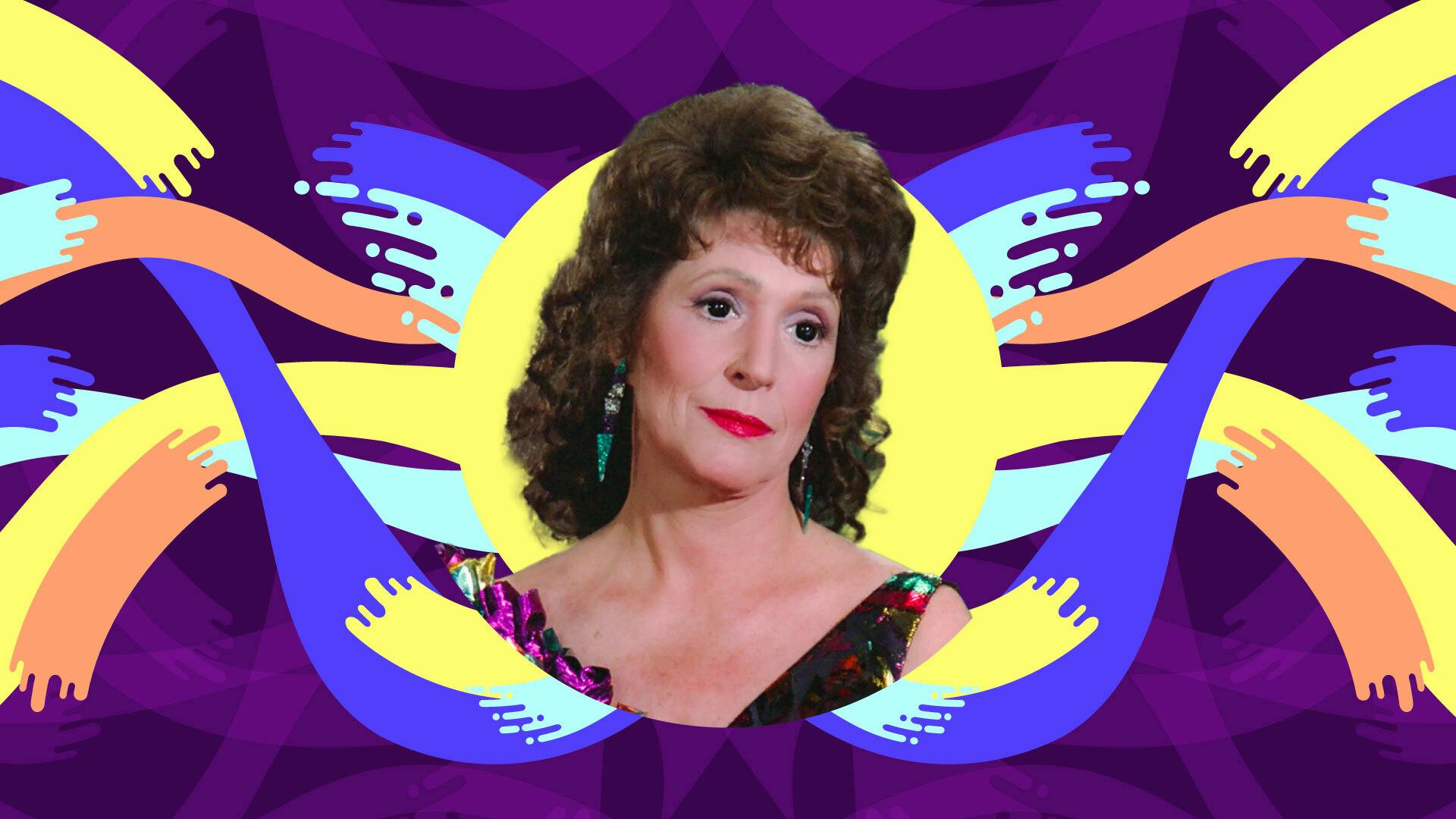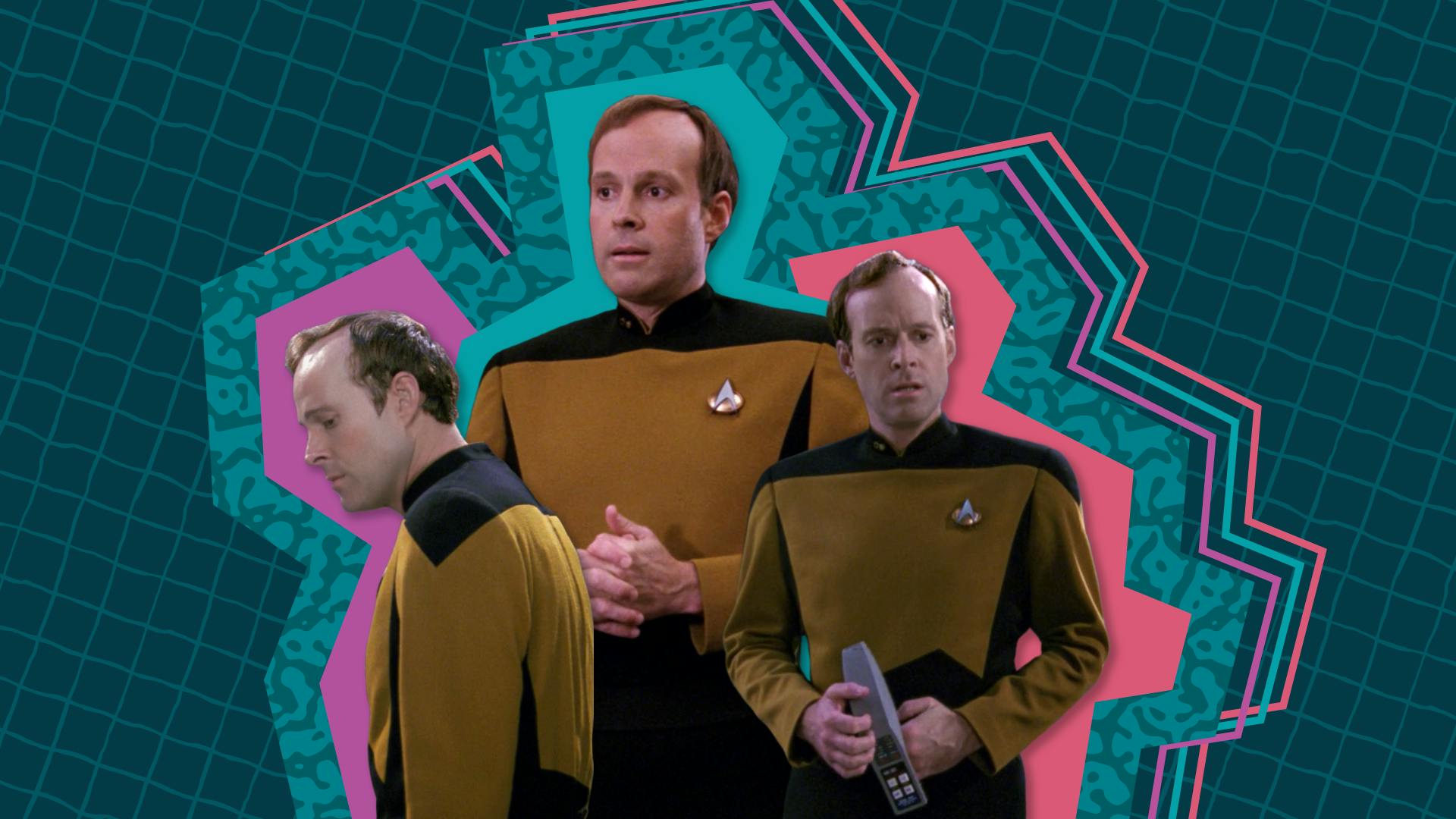Published May 14, 2025
Why 'Sarek' Still Makes Us Cry, 35 Years Later
This story about parenthood and loss hasn't lost any of its emotional punch.

StarTrek.com
On May 14, 1990, we saw Jean-Luc Picard weather a very different trauma, just a few episodes before he was forcibly assimilated into the Borg Collective.
For a brief moment, Jean-Luc became a deeply sad, estranged parent, by proxy. When Sarek and Picard mind-melded in "," Episode 23 in Season 3 of , it was a major crossover event for fans of the '60s series. But, 35 years later, this episode is wonderful not just because of its blending of with The Next Generation; it's more profound than that.
"Sarek" is meditative study about our sympathies for our parents and grandparents. And, it entreats us to think hard about how those people remember us.
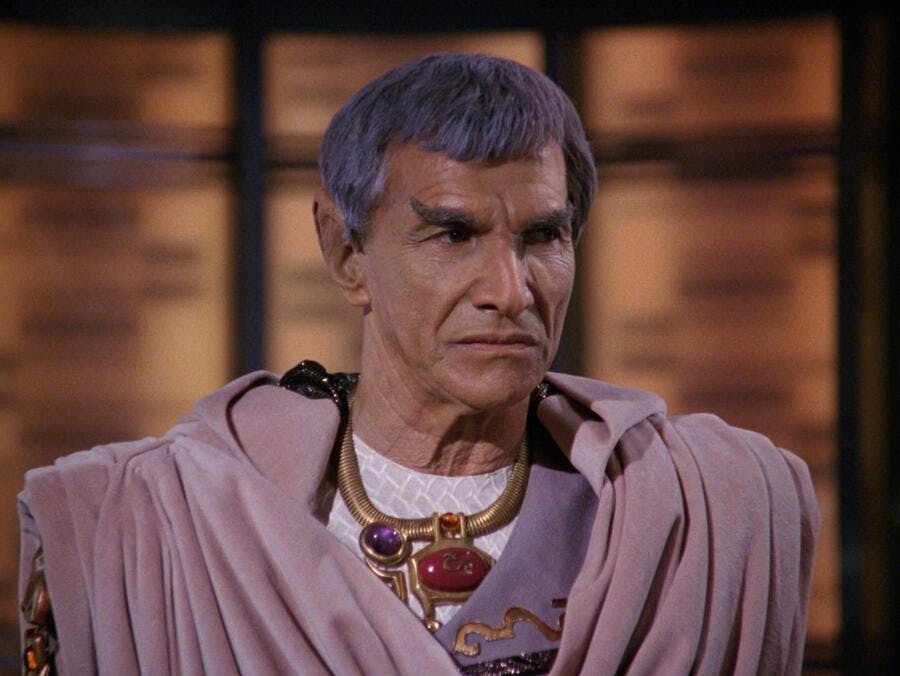
"Sarek"
StarTrek.com
It's easy to feel sorry for Sarek in the opening moments of this episode. Like Bones walking the corridors of the Enterprise-D with Data in "," Sarek is surrounded by a bunch of people who couldn't possibly remember what he was really like when he was younger. In this way, the episode almost speaks directly to the audience — we know Sarek is Spock's dad, we know he was a huge deal in the "" and the classic films, but for the crew of the Enterprise-D, he's just a really famous ambassador they're trying not to offend.
Sarek is a victim of his own success, which means, even before he beams aboard in the at the beginning of the episode, he's already isolated from the other characters. His aides tell Picard not to disturb Sarek with fun stuff like invitations to Mozart recitals, and, within moments of inspecting his new conference room, Sarek throws a fit, and basically tells everyone they have no idea what they're doing. What's going on?
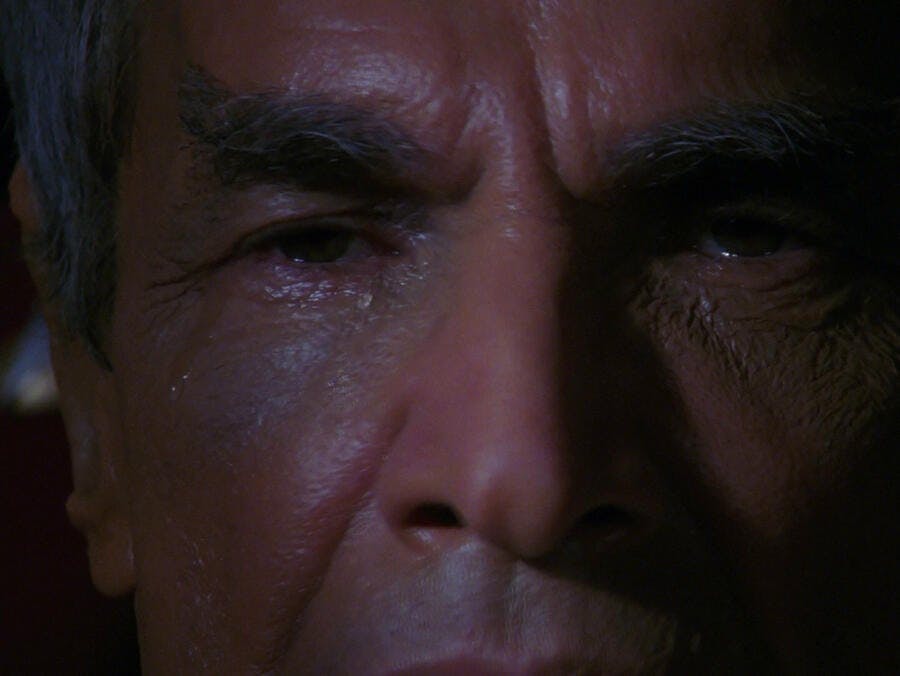
"Sarek"
StarTrek.com
As the episode unfolds, we learn, painfully, that Sarek is not himself. He’s contracted a rare Vulcan disease, , which, by all accounts is an attack on his personhood. For anyone who has a loved one with Alzheimer's, has seen a parent deal with a severe stroke, or has any experience with dementia, the themes of "Sarek" will be tenderly familiar. When my own father was dying of liver cirrhosis nearly a decade ago, I was told the toxins in his blood caused hepatic encephalopathy, which effectively meant that he literally was in no kind of control of his behavior. In these moments, I remembered "Sarek," and — beyond just helping with the pain — the concept of this episode also helped me to contextualize my sympathy for my father.
Sarek's mental breakdown sends telepathic waves through the crew of the Enterprise, leading to anguish and fights; but any family who has struggled with a declining parent or grandparent knows this metaphor isn't that far off. When someone so strong becomes less so, it feels like a physic attack on the emotions of everyone involved. The writing of "Sarek" is wise enough to remind us that people afflicted with conditions that affect their brains aren't the only victims; the family suffers, too. The crew of the Enterprise-D might not be Sarek's direct family, but let's face it, they're close enough. Does Sarek trust Picard instantly because he had previously put his trust in other Enterprise captains? It seems only logical. Picard is not related to Kirk by blood, but for Sarek, Picard is, on some level, a descendant of Kirk. Who else could he trust with his own sanity?

"Sarek"
StarTrek.com
The entire episode is fantastic, but the mind-meld between Picard and Sarek, and the ensuing scene in which Picard experiences Sarek's emotions, are literally some of the greatest emotional rollercoasters in all of Star Trek. For one thing, this episode marked a huge shift that allowed The Next Generation to more overtly reference The Original Series, that heartfelt second when Picard — working through Sarek's emotional grief — blurts out "Spock!" with a tear in his eye. If you dust-off your Next Generation blu-rays, you'll find a great special feature in which writer/producer Ira Steven Behr talks about fighting tooth and nail to get that specific reference in the final shooting script. At the time, TNG was shy of being too referential to The Original Series. This episode was almost like the new crew of the Enterprise-D was giving the TOS era a huge hug.
For fans like me, who literally grew-up watching TNG, the episode "Sarek" represented my parents' generation trying to find their way in the brave new world. It's an episode that has sympathy for a generation that came before, but doesn't turn that sympathy into infantilizing charity. Picard truly respects Sarek, but after the mind-meld, he truly knows the guy. After everyone is more or less back to normal, Sarek tells Picard, "We shall always retain the best part of the other... inside us." Picard responds, "I believe I have the better part of that bargain, Ambassador."
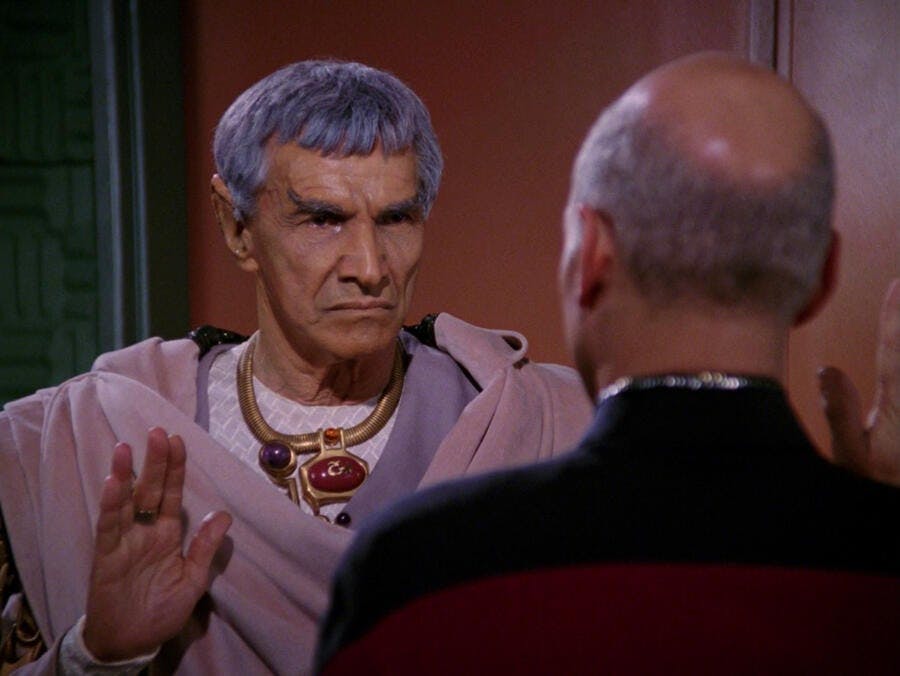
"Sarek"
StarTrek.com
In the 35 years since "Sarek" has aired, we've learned a lot more about the titular Vulcan, but obviously, a lot about Jean-Luc Picard, too. In , James Frain's brilliant interpretation of a younger Sarek adds a layer of emotional complexity to this episode when you rewatch it. Now, when Picard says "Amanda" and laments how Sarek never told her he loved her, it's very easy to picture Mia Kirshner's Amanda Grayson from Discovery. And, because we know from Discovery episodes like "Lethe," about how badly Sarek feels about his parental failures towards Michael Burnham, it really makes you wonder if Picard didn't experience some of that pain, too. If you want to get really technical about it, "Lethe" could scan as a spiritual prequel to "Sarek"; both are focused on the mind of this complicated Star Trek parent, and both episodes come out on the side of sympathy and understanding.
Still, whether it's Discovery, "Journey To Babel," "Yesteryear," or , or even "," most Sarek stories tend to depict the character through the lens of his children — Spock, Sybok, and Michael Burnham. "Sarek" is a different kind of thing because it's actually the story of the estranged parent without the context of the children. Spock isn't in the episode, and, Amanda, we have to assume, has been dead for a long time. What does a person defined by his parenthood do when he's no longer that person?
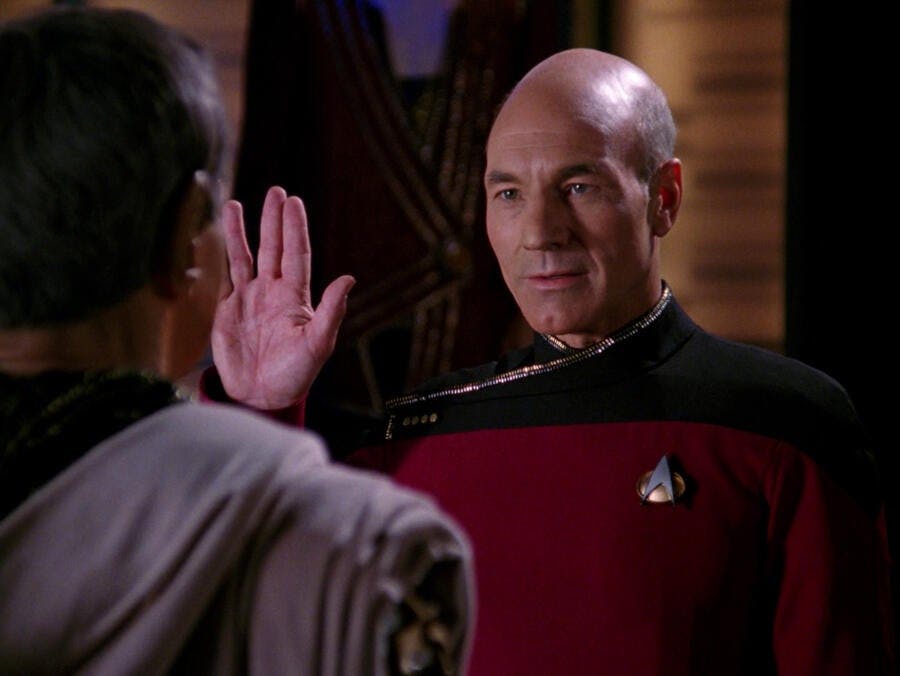
"Sarek"
StarTrek.com
As a relatively new parent myself (I have a toddler), this question is haunting. I don't think Sarek was always a great parent to his children. But, that's kind of the point. All parents make mistakes, the tragedy of Sarek's parenting is that he failed to express the love he felt for his family before totally losing his mind. We humans don't partition our emotions off the way Vulcans do, but when life gets hard, sometimes the cold comfort of stoicism is very attractive. But, "Sarek" reminds us to be careful about getting too cold. If you love someone, you have to tell them. Sarek's children loved him and he loved them, of course. But, the tragedy of so many lives, when we eventually lose that person, and we feel like we never got to say the right things to them before it was too late.
Star Trek presents a beautiful fantasy — Jean-Luc Picard becomes the conduit that lets Spock connect with his father after death. We should all be so lucky to have a connection like that.


